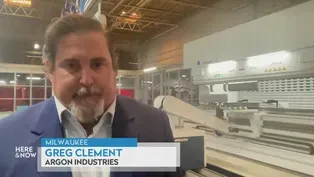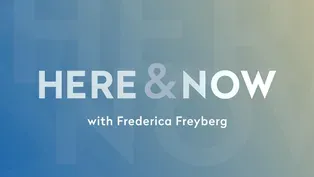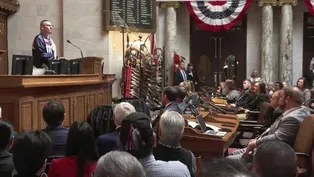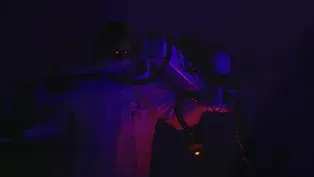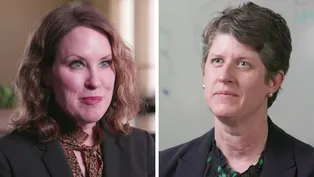Here and Now
Sheriff Matt Joski on Local Enforcement of Immigration Laws
Clip: Season 2300 Episode 2336 | 5m 56sVideo has Closed Captions
Matt Joski on immigration as a bill would require sheriffs to assist federal enforcement.
Kewaunee County Sheriff Matt Joski discusses his stance on immigration laws as Republican lawmakers advance a bill that would require Wisconsin sheriffs to assist federal authorities with enforcement.
Problems with Closed Captions? Closed Captioning Feedback
Problems with Closed Captions? Closed Captioning Feedback
Here and Now is a local public television program presented by PBS Wisconsin
Here and Now
Sheriff Matt Joski on Local Enforcement of Immigration Laws
Clip: Season 2300 Episode 2336 | 5m 56sVideo has Closed Captions
Kewaunee County Sheriff Matt Joski discusses his stance on immigration laws as Republican lawmakers advance a bill that would require Wisconsin sheriffs to assist federal authorities with enforcement.
Problems with Closed Captions? Closed Captioning Feedback
How to Watch Here and Now
Here and Now is available to stream on pbs.org and the free PBS App, available on iPhone, Apple TV, Android TV, Android smartphones, Amazon Fire TV, Amazon Fire Tablet, Roku, Samsung Smart TV, and Vizio.
Providing Support for PBS.org
Learn Moreabout PBS online sponsorshipand issues facing Wisconsin's education system as deportations escalate across the country.
The state assembly this week passed a bill that would require county sheriffs to cooperate with federal immigration authorities.
The bill would require that sheriffs request proof of legal presence in the U.S. From people held in a county jail on a felony charge, and report them to the U.S. Department of Homeland Security.
It would also require sheriffs to comply with federal detainer warrants that is, holding an unauthorized person jailed on a criminal offense for ice failure to comply would result in the loss of 15% of a county's shared revenue payments.
If the bill makes it to the governor's desk, he says, he will veto it.
The Kewaunee County sheriff has weighed in on the immigration issue, calling for keeping his community safe, while at the same time calling for compassion.
Sheriff Matt Joski joins us now.
And Sheriff, thanks very much for being here.
>> Thank you for having me.
>> So you have said that you, of course, are committed to protecting your community by enforcing the laws.
But you see the potential for, quote, untold levels of human suffering due to the rigid application of our laws.
Does this bill strike you as that rigid application of laws?
>> You know, this really doesn', because you have to remember what we're talking about here activity.
So that's the separation there.
When we talk about people that are in our communities that are committing crimes, I think it's I think it's incumbent on us.
Right?
It's absolutely our responsibility as law enforcement officials to collaborate and cooperate at all levels.
We've been doing this for decades.
It's unfortunate that it's reached this level.
I think of emotion and feeling.
But we have to get back to basics that we always have and always will collaborate and cooperate with those state and federal entities that partner with us to keep our community safe.
cause human suffering as a result of immigration rules and laws?
>> I think when we talk about the next phase, you know, what we're seeing happen now with this focus on those criminal elements in our country.
Again, I commend it.
I'm grateful for it because that is, in essence, keeping our community safe.
But it's when we get to this next phase, when we start talking about those individuals, these families that are here, how do we treat them?
And I think you're referring to an article I wrote where we have to make sure that we don't put everything into one group, that we treat those here for whatever reason, that they're here, but they're raising their children, working jobs, really trying to be contributing members of our society.
I cannot imagine a reality where we treat them the same as the criminal elements.
So that's where I make a separation in how we process it.
And I hope that we as a country, I think we are I think we're smart enough.
I think we have the capability to separate this out and do the right thing.
When it comes to the families, to the men and women that are here, honestly trying to make this country a better place.
>> So have you seen ice in your community removing law abiding, if unauthorized immigrants.
>> Over the decades?
Again, this is nothing new.
Over the decades, especially with the onset of our large agricultural farms, we have had ice in our community.
We have not taken an active role in their operations.
There's always a courtesy where they make us aware of their presence when they are engaged in their operations.
But all these years, it's just been a matter of awareness.
Situational awareness and support in the event that they would need us.
>> Now, I read that your officers do not ask for the status of people pulled over in a traffic stop or report people in the community without legal authorization to be in the US to Ice.
Why not?
>> Because at this point, there's really no purpose to it.
I don't know where that information would be relevant.
Again, it's not our role to enforce immigration laws.
Now, mind you, when we do have somebody, whether it's on a traffic stop or if they're involved in a complaint, no different than anyone else in the community, we of course, you know, we do collect names and information as any good law enforcement agency would.
But as far as specifically asking for a targeting that population, again, there's really no merit to it.
to your persuasion position on this from other law enforcement across the state?
>> I think that overall, I would think that law enforcement were very like minded.
Again, our priority is keeping our community safe, but we also understand the need for compassion for humanity to look at this at a deeper sense and not just take everything as sort of a one size fits all approach.
So I do think there's a commonality across the state.
>> You've advocated also, however, without success for the creation of a driver's card program in the state of Wisconsin.
Why is that?
>> So that was over a decade ago.
And it's it was a it was a moment in time where the climate, I think, had lent itself to maybe that conversation.
But unfortunately, just as in today's conversations, it automatically goes to a sense of entitlement.
Or what is that granting them?
And I think from our perspective, over a decade ago, it was about public safety, a mechanism by which folks could be trained to drive and making sure that they have the correct requirements, as you and I do, to operate on our roads.
The ability to have auto insurance.
So if and when they're involved in auto accidents, and then actually additional criteria could have been placed on it in regards to their obligation in pursuing citizenship.
Now, had that been done over a decade ago, we might be looking at an entirely different landscape here in the state of Wisconsin.
But again, unfortunately, a lot of times the emotion and fear takes the day and it never went anywhere.
So I don't envision in today's climate that that would ever be something that we could resurrect.
Joski from Kewaunee County, we really appreciate your time
Greg Clement on Tariffs, Trade and Wisconsin Manufacturing
Video has Closed Captions
Greg Clement on how metal fabricator Argon Industries is adjusting to tariff uncertainty. (5m 30s)
Here & Now opening for March 21, 2025
Video has Closed Captions
The introduction to the March 21, 2025 episode of Here & Now. (1m 10s)
Wisconsin's Tribal Nations State Their Priorities for 2025
Video has Closed Captions
Thomas Fowler of the St. Croix Chippewa delivers the 2025 State of the Tribes Address. (5m 15s)
The Rape Kit Backlog and Wisconsin's 2025 Supreme Court Race
Video has Closed Captions
Testing sexual assault evidence is at issue in the 2025 race for Wisconsin Supreme Court. (5m 58s)
Brittany Kinser, Dr. Jill Underly on Education in Wisconsin
Video has Closed Captions
Brittany Kinser and Jill Underly on goals for students and schools in the state in 2025. (2m 8s)
Providing Support for PBS.org
Learn Moreabout PBS online sponsorshipHere and Now is a local public television program presented by PBS Wisconsin
